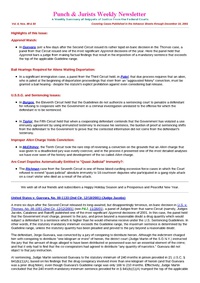A mere six days after the Second Circuit released its long-awaited, but disappointingly timorous, en banc decision in U.S. v. Thomas, No. 98-1051 (2nd Cir. 12/12/2001) (see P&J, 11/26/01), a panel of Judges from that same Circuit (namely, Judges Jacobs, Calabresi and Rakoff) published one of the most significant …
Here the Court held that due process requires that an alien, who is jailed at the beginning of deportation proceedings that stem from an “aggravated felony” conviction, must be granted a bail hearing - despite the statute's prohibition of bail.
In an important immigration decision that could affect …
This is one of those barbaric, police brutality cases that makes your blood curdle. It is also a case that shows the arrogance of power and makes one wonder whether the ever-growing shield of immunity so often and so easily granted to law enforcement officials actually encourages the type …
The issue before the Court in this case was whether a police officer who conducts a coercive, custodial interrogation of a suspect who is being treated for life-threatening, police-inflicted gunshot wounds may invoke qualified immunity in a civil suit for damages under 42 U.S.C. § 1983 (2001). Under the …
The police stopped Mark Davis at a roadblock in 1999, arrested him for traffic offenses, searched him and his automobile, and recovered evidence of his drug dealing, for which the grand jury indicted him. After the district court denied Davis's motion to suppress, he entered a conditional plea of …
Here the Court held that the Guidelines do not authorize a sentencing court to penalize a defendant for refusing to cooperate with the Government in a criminal investigation unrelated to the offense for which the defendant is to be sentenced.
This is an important sentencing case in which …
This is a rare case in which the Court vacated a sentence on the grounds that the Government had failed to prove that statements made in the presentence report (PSR), and on which the district court relied for sentencing purposes, contained even the “indicia of reliability” required by U.S.S.G. …
The defendant in this case was indicted for his alleged involvement in a prison drug smuggling operation at the Leavenworth penitentiary. His first trial resulted in a hung jury (ten to two in favor of conviction). Several months later, he was tried again. McElhiney represented himself at trial, during …
Here, on remand from the Suoreme Court, the 11th Circuit affirmed the sentence that the Supreme Court had vacated and held that (a) Apprendi claims are not jurisdictional, and (b) 21 USC § 841(b)(1)(A) is not facially unconstitutional.
Here, in rejecting the defendant's argument that Apprendi v. New Jersey, 530 U.S. 466 (2000) requires a jury to determine the fact of a prior conviction as an essential element of an illegal reentry charge (in violation of 8 U.S.C. § 1326), the Court stated:
"Echavarria's argument is foreclosed …
The petitioner/defendant in this case was convicted of manufacturing and possessing marijuana with intent to distribute; and the district court imposed a mandatory minimum sentence of 10 years based on its determination that the defendant had grown more than 1000 marijuana plants when the jury made no determination as …
Here the Court held that Apprendi did not require an indictment for being a felon in possession of a gun to allege the nature of the defendant's prior felony offenses or require that the jury to find those offenses for enhanced sentences to apply.
The defendant in this …
Here the Court held that 8 USC § 1326 which criminalizes attempts to reenter the U.S. after a previous deportation applied to an alien on board a vessel in international waters, outside the U.S. contiguous zone and some 15 nautical miles from Puerto Rico.
In this case, the …
In this case, the defendant was sentenced to 262 months in prison based on the district court's determination that he was responsible for more than the 50 kilograms of marijuana that would have triggered the default statutory maximum penalty of 5 years set forth in 21 U.S.C. § 841(b)(1)(D). …
Here over the dissent of Judge Seymour, the Court reversed a suppression order that had been granted on the grounds that no factual nexus existed between the defendant's unlawful detention and the discovery of drugs in a car in which he was a passanger.
Here the Court held that the prison's policy of stripping inmates and requiring them to undergo delousing procedure was an unreasonable search that subjected prison officials to liability for damages for which they were not entitled to qualified immunity.
